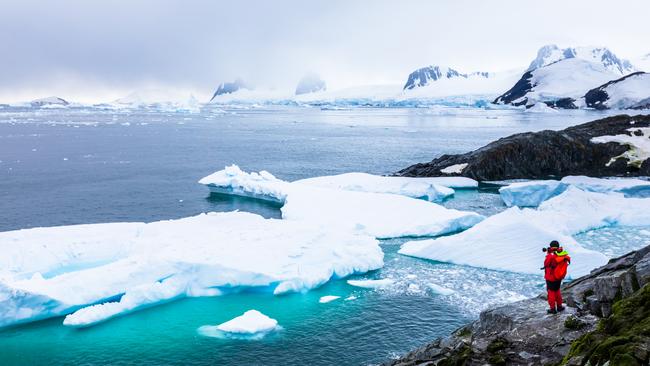Antarctica’s preservation has been a glorious feat of global generosity. Let’s keep it that way
We’ve left Antarctica largely alone except in the noble pursuit of scientific inquiry. But how much longer can this arrangement last?

At the end of our world there’s a wonderland that has an innocence to it, a purity, that feels fragile and spiritual. This extraordinary region is relatively untouched. It’s a region that demonstrates humanity at its best; for that pesky, rapacious species known as human has actually left this place largely alone except in the noble, light-touch pursuit of scientific inquiry. This gentleman’s agreement is honourable and altruistic – astonishingly so, in this day and age – and has been respected for 60-odd years. But how much longer can this arrangement be preserved?
I’m talking about Antarctica, of course. The vast continent that’s a barometer of human goodness. It shows us that wealthy nations can act with consensus and without greed and selfishness when it comes to valuable land and its resources; it’s actually possible. Because, well, humans. What are they, exactly? An entity looking at us from elsewhere would be hard-pressed to come to any other conclusion: we are killers. Plunderers, predators, polluters. The alpha species of a planet we’ve done untold damage to and continue to destroy for our own selfish appetites.
But the marvellous ice-helmeted land at the end of this Earth arrests this image. It is the continent upon which no human lives permanently; just a handful come and go for the good of science. I visited Antarctica on a trip resupplying Australia’s research bases and it felt as if we were intruders in this wonderland. The scientists treated it as an honour to be working with the singular wildlife.
The animals that greeted us seemed fearless and open and curious because they had no knowledge of what we do; of how dangerous humans are. Animals such as a baby seal with its umbilical cord still attached, snap frozen to its belly, who stared at us with deep, soft brown eyes clear with curiosity and trust. Snow petrels circled our ship, calling and dipping and soaring like angels. Penguins fanned away on the ice, waddling like fast metronomes; on land they peered with voracious curiosity, inching forward, movingly trusting. (We would crawl on our stomachs to observe the wildlife, out of respect, because the animals had never known anything taller than them.)
Now there are rumblings of restlessness, from China in particular, over the constraints of the Antarctic Treaty. In 1959, the Antarctic nations put aside their claims to the region and agreed to the peaceful pursuit of scientific enquiry. It was an extraordinary act of altruism. And Environment Minister Sussan Ley recently declared our nation would “not countenance” any undermining of the system.
But China is quibbling over many of the treaty’s constraints involving marine protected areas, krill fishing and catch limits. Antarctic expert Dr Tony Press has called for a ramping up of our government’s leadership in this area. Because, well, where does it end? Dr Press said Australia – as a treaty founder and instigator of the Madrid Protocol, which bans any mining in Antarctica until at least 2048 – needs to make a “line in the snow” against China’s erosions of consensus. “Countries like Australia, the UK, the original 12 [treaty] signatories should be saying ‘this behaviour is not acceptable’,” Dr Press told The Australian. The treaty’s not just about protecting wildlife. “[It] bans military activities. That means that we don’t have to have half of our navy belting around the Southern Ocean. That’s incredibly strategically important for Australia.”
Imagine, one day, this glorious wildscape being mined. Antarctica’s preservation in its pristine condition has been a glorious feat of global generosity. It shows that the strange, self-interested species known as human can actually be selfless and bold; it demonstrates the best of our instincts. Let’s keep the continent this way – as a tuning fork for how we want to work with other vulnerably wild regions of our beautiful planet in the long term.




To join the conversation, please log in. Don't have an account? Register
Join the conversation, you are commenting as Logout